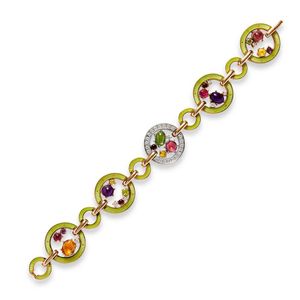Faberge Victor Mayer Multicolored Gemstone Bracelet
Victor Mayer for Faberge a limited edition 18ct Varicoloured gold, diamond, gemstone and enamel bracelet, property from the estate of a distinguished Sydney collector, centring an annular link bordered by pave-set brilliant-cut diamonds flanked by similarly shaped textured links applied with green guilloche enamel partially decorated with claw-set diamonds and variously cut multi-coloured gemstones including amethyst, citrine, pink tourmaline, garnet and peridot between oval gold connectors, the diamonds together weighing approximately 0.50 carats, length 195 mm, limited edition 8/150, maker's marks for Victor Mayer, signed Faberge.
You must be a subscriber, and be logged in to view price and dealer details.
Subscribe Now to view actual auction price for this item
When you subscribe, you have the option of setting the currency in which to display prices to $Au, $US, $NZ or Stg.
This item has been sold, and the description, image and price are for reference purposes only.
- Garnet - A garnet is a mineral that is commonly used as a gemstone. It occurs in a wide range of colours, including red, pink, orange, green, yellow, and black. The most common and best known type of garnet is the red variety, which has a deep, rich colour and is often referred to as a "garnet red."
Garnets have a long history of use as gemstones, and they have been prized for their beauty and durability for thousands of years. They are often used in jewellery, such as rings, necklaces, and earrings, and they are also sometimes used as a decorative element in other items, such as vases and goblets.
Garnets are prized for their brilliance, durability, and resistance to scratching, making them a popular choice for use in jewellery. They are also valued for their hardness, which makes them well suited for use in abrasive applications, such as sandpaper and grinding wheels. - Guilloche - A form of classical decoration consisting of a repeating ornament of interlacing curved bands, sometimes forming circles, and further decorated with rosettes or other flower forms.
The name is derived from the inventor, French engineer Guillot, who invented a mechanical method of inscribing fine repeating patterns on to metallic surfaces.
On enamelled items with guilloche decoration, the surface is firstly engraved with the repeating pattern, and then covered with several layers of enamel, each of which is fired.
Where the item has not been enamelled the form of decoration is usually called "engine turned".
This item has been included into following indexes:
